2020秋七年级英语上册Unit6Doyoulikebananas单词短语归纳新版人教新目标版
人教版七年级上册英语讲义 Unit 6 Do you like bananas

Unit 6 Do you like bananas? 讲义一、【重点单词】banana /bə'nɑ:nə/香蕉hamburger /'hæmbɜ:(r)ɡə(r)/汉堡包tomato /tə'mɑ:təʊ/西红柿ice-cream /,aɪs'kri:m/冰激凌salad /'sæləd/沙拉strawberry /'strɔ:berɪ/草莓pear /peə(r)/梨milk /mɪlk/牛奶bread /bred/面包birthday /'bɜ:(r)θdeɪ/生日dinner /'dɪnə(r)/(中午或晚上吃的)正餐week /wi:k/周;星期food /fu:d/食物sure /ʃʊə(r)/当然;肯定;一定burger /'bɜ:(r)ɡə(r)/汉堡包= hamburgervegetable /'veʤtəbəl/蔬菜fruit /fru:t/水果right /raɪt/正确的;适当的apple /'æpl/苹果then /ðen/那么egg /eɡ/蛋;鸡蛋carrot /'kærət/胡萝卜rice /raɪs/大米;米饭chicken /'ʧɪkɪn/ji鸡肉so /səʊ/ (引出评论或问题)那么breakfast /'brekfəst/早餐;早饭lunch /lʌnʧ/午餐star /stɑ:(r)/明星;星星eat /i:t/吃well /wel/好;令人满意的habit /'hæbɪt/习惯healthy /'helθi/健康的really /'ri:əli/真正地question /'kwesʧən/问题want /wɒnt/需要;想要be /bi:/变成fat /fæt/肥的;肥胖的二、【重点短语】1. John ’s birthday dinner 约翰的生日宴会2. vegetable salad 蔬菜沙拉3. two tomatoes 两个西红柿4. eat well 吃得营养5. think about 考虑6. eat/have breakfast/lunch/dinner 吃早/午/晚饭7. sports stars 体育明星8. the volleyball star 排球明星9. ask sb. about sth. 问某人某事10. like hamburgers/ice-cream 喜欢汉堡包/冰淇淋11. like eating eggs 喜欢吃鸡蛋12. her eating habits 她的饮食习惯13. be (not) healthy (不)健康14. one last question 最后一个问题15. healthy food 健康食物16. after breakfast/lunch/dinner 早/午/晚饭后17.one last question 最后一个问题18.some fruit 一些水果19.for dinner 作为晚餐20.how about 怎么样三、【重点句型】1.—Do you like salad? 你喜欢沙拉吗?一Yes,I do. /No, I don’t. 是的,我喜欢。
新目标七年级上册Unit6Do you like bananas?讲解与练习

新目标七年级上册Unit6Do you like bananas?讲解和练习讲解1、必背短语French fries炸薯条,ice cream冰淇淋,countable noun 可数名词,uncountable noun不可数名词,running star赛跑明星,healthy food健康食品,lots of=a lot of 大量;许多,a list of food食物清单,eat well吃得好2、词语辨析have和eathave 既可以指“吃”,也可以指“喝”。
I want to have some milk and some apple.我想喝些牛奶,吃些苹果。
eat 通常作“吃”。
I eat an apple every day.我每天吃一个苹果。
3、句型讲解1). —Do you like oranges? 你喜欢桔子吗?—Yes, I do. (P31) 是的,我喜欢。
like意为“喜欢”,“喜爱”。
like somebody or something 表示“喜欢某人或某事”。
如:I like him very much. 我非常喜欢他。
He doesn’t like salad. 他不喜欢沙拉。
2). —Let’s have French fries. 我们吃炸薯条吧。
—Oh, no. I don’t like. (P32) 哦,不,我不喜欢。
动词have意为“吃”,“喝”,是实义动词。
如:We have breakfast at seven. 我们七点钟吃早饭。
I don’t have coffee in the evening. 晚上我不喝咖啡。
注意:have 作此义解时,变成疑问句和否定句时必须用助动词do。
试译:你每天在家吃中饭吗?误:Have you lunch at home every day?正:Do you have lunch at home every day?3). Runner eats well! (P35) 赛跑选手吃得好!1)辨析:eat 或have:eat 与have 都可以表示“吃”的意思,有时两者可互换。
人教版2020年七年级英语上册Unit6Doyoulikebananas讲义(新版)人教新目标版
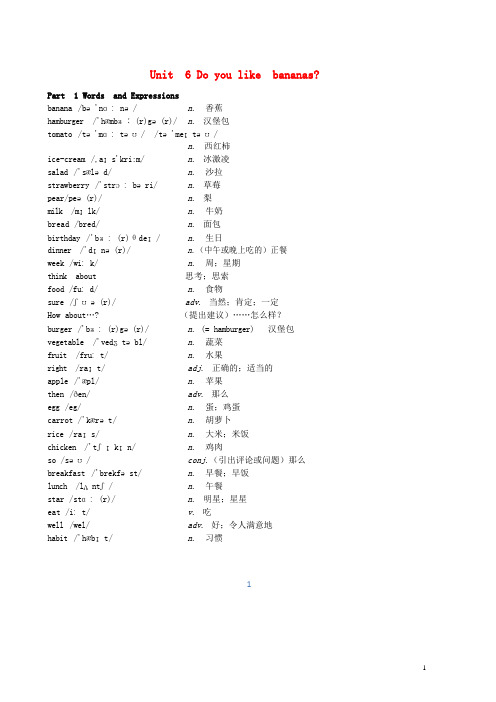
Unit 6 Do you like bananas?Part 1 Words and Expressionsbanana /bə'nɑːnə/ n. 香蕉hamburger /'hæmbɜː(r)gə(r)/ n. 汉堡包tomato /tə'mɑːtəʊ/ /tə'meɪtəʊ/n. 西红柿ice-cream /,aɪs'kri:m/ n. 冰激凌salad /'sæləd/ n. 沙拉strawberry /'strɔːbəri/ n. 草莓pear/peə(r)/ n. 梨milk /mɪlk/ n. 牛奶bread /bred/ n. 面包birthday /'bɜː(r)θdeɪ/ n. 生日dinner /'dɪnə(r)/ n.(中午或晚上吃的)正餐week /wiːk/ n. 周;星期think about 思考;思索food /fuːd/ n. 食物sure /ʃʊə(r)/ adv. 当然;肯定;一定How about…?(提出建议)……怎么样?burger /'bɜː(r)gə(r)/ n. (= hamburger) 汉堡包vegetable /'vedʒtəbl/ n. 蔬菜fruit /fruːt/ n. 水果right /raɪt/ adj. 正确的;适当的apple /'æpl/n. 苹果then /ðen/adv. 那么egg /eg/ n. 蛋;鸡蛋carrot /'kærət/ n. 胡萝卜rice /raɪs/ n. 大米;米饭chicken /'tʃɪkɪn/ n. 鸡肉so /səʊ/ conj.(引出评论或问题)那么breakfast /'brekfəst/ n. 早餐;早饭lunch /lʌntʃ/ n. 午餐star /stɑː(r)/ n. 明星;星星eat /iːt/ v. 吃well /wel/ adv. 好;令人满意地habit /'hæbɪt/ n. 习惯1healthy /'helθi/adj. 健康的really /'riːəli/ adv. 真正地question /'kwestʃən/ n. 问题want /wɒnt/ v. 需要;想要be /biː/ v. 变成fat /fæt/adj. 肥的;肥胖的Part 2:Texts课文(一)Jack: Hey, John’s birthday dinner is next week. Let’s think about the food.Tom: Sure. How about burgers, vegetable salad, and some fruit? Bill: Sounds good. John likes hamburgers.Jack: Oh, I don’t like salad.Bill: But John likes salad, and it’s his birthday.Jack: Yes, you’re right. What about the fruit?Tom: I think John likes strawberries and apples.Jack: OK. Let’s have strawberries and applesthen.Structure——谈论好恶1.Do you like salad? Yes, I do./No, I don’t.2.Do they like pears? Yes, they do./ No, they don’t.3.Does she like tomatoes? Yes, she does./ No, she doesn’t.4.I like oranges. I don’t like bananas.5.We like rice. We don’t like hamburgers.6.He likes ice-cream. He doesn’t like vegetables.重点句型:—Do / Does sb. like…?—Yes, sb. do / does.—No, sb. don’t / doesn’t.sb. like/likes ….sb. don’t/doesn’t like ….Underline the correct words in the brackets.在括号内正确的单词下画线。
七年级英语上册重点单词短语句型汇总:Unit6

七年级英语上册重点单词短语句型汇总:Unit6涓冨勾绾ц?/鍙ュ瀷姹囨€伙細Unit6 Unit6 Do you like bananas??1. John 鈥檚birthday dinner ?2. vegetable salad3. two tomatoes 涓や釜瑗跨孩鏌?4. eat well 鍚冨緱钀ュ吇5. think about 鑰冭檻6. eat/have breakfast/lunch/dinner 鍚冩棭/鍗?鏅氶キ7. sports stars 浣撹偛鏄庢槦8. the volleyball star 鎺掔悆鏄庢槦9. ask sb. about sth. ?10. like hamburgers/ice-cream ?鍐版穱娣?11. like eating eggs ?12. her eating habits13. be (not) healthy 锛堜笉锛夊仴搴?14. one last question ?15. healthy food 鍋ュ悍椋熺墿16. after breakfast/lunch/dinner 鏃?鍗?鏅氶キ鍚?銆愰噸鐐瑰彞鍨嬨€?1.鈥旸o you like salad? 浣犲枩娆㈡矙鎷夊悧锛?涓€Yes锛孖do. /No, I don鈥檛. ?銆?2.鈥旸oes she like tomatoes? 濂瑰枩娆㈣タ绾㈡熆鍚楋紵鈥昇o锛宻he doesn鈥檛. She doesn't like them.?3.What fruit do you like?涓€I like apples and strawberries. 鎴戝枩娆㈣嫻鏋滃拰鑽夎帗銆?4.I don鈥檛like carrots. ?5.He likes salad. 浠栧枩娆㈡矙鎷夈€?6.She doesn鈥檛like hamburgers or chicken.銆?7.鈥旽ow/What about some fruit?(鍚?鈥昐ounds good. 濂藉晩銆?8.涓€What do you like for breakfast/lunch/dinner?浣犳棭/鍗?粈涔堬紵鈥旾love fruit. I think it 鈥檚healthy.搴风殑(椋熺墿锛?9.I don鈥檛want to be fat. 鎴戜笉鎯冲彉鑳栥€?10.Let鈥檚have apples and milk then. с€?銆愰噸鐐瑰崟璇嶃€?banana /b?'na:n?/ n. 棣欒晧hamburger /'h?mb?:g?/ n. 姹夊牎鍖?tomato /t?'ma:t?u/ n. 瑗跨孩鏌?ice-cream /ais'kri:m/ n. 鍐版縺鍑?salad /'s?l?d/ n. 娌欐媺strawberry /'str?:b?ri/ n. 鑽夎帗pear /pe?/ n. 姊╩ilk /milk/ n. 鐗涘ザbread /bred/ n. 闈㈠寘birthday /'b?:胃dai/ n. 鐢熸棩dinner /'din?/ n. (? week /wi:k/ n.think about 鎬濊€冿紱鎬濈储food /fu:d/ n. 椋熺墿sure /?u?/ adv. 褰撶劧锛涜偗瀹氾紱涓€瀹? How about...? ()......鎬庝箞鏍凤紵burger /'b?:g?/ n. (=hamburger)姹夊牎鍖? vegetable /'ved?t?bl/ n.fruit /fru:t/ n. 姘存灉right /rait/ adj. 姝g‘鐨勶紱閫傚綋鐨? apple /'?pl/ n. 鑻规灉then /een/ adv. 閭d箞egg /eg/ n. 铔嬶紱楦¤泲carrot /'k?r?t/ n. 鑳¤悵鍗?rice /rais/ n. 澶х背锛涚背楗?chicken /'t?ikin/ n. 楦¤倝so /s?u/ conj. (?閭d箞breakfast /'brekf?st/ n. ? lunch /l?nt?/ n.star /sta:/ n. 鏄庢槦锛涙槦鏄?eat /i:t/ v. 鍚?well /wel/ adv. 濂斤紱浠や汉婊℃剰鍦?habit /'h?bit/ n. 涔犳儻healthy /'hel胃i/ adj. 鍋ュ悍鐨?really /'ri:?li/ adv. ?question /'kwest??n/ n.want /w?nt/ v.be /bi:/ v. 鍙樻垚fat /f?t/ adj. 鑲ョ殑锛涜偉鑳栫殑。
高中英语unit6 Do you like bananas

Unit 6 Do you like bananas?你喜欢香蕉吗?☞【学习目标汇总:】【教材重点解析】:1.t omato 西红柿(教材第31页)tomato可数名词,复数为:tomato es.There are three tomatoes on the table.桌子上有三个西红柿。
______(西红柿)。
解析:tomato可数名词,复数为:tomato es.句意:我喜欢许多蔬菜,比如卷心菜、胡萝卜和西红柿。
答案:tomato es.2. Do you like bananas? 你喜欢香蕉吗。
(教材第31页)☆☆☆☆☆必考○1可数名词可用复数表示一类人或事物.○2询问某人的喜好,通常用一般疑问句:Do / Does +主语+ like + 其他?肯定回答:Yes , 主语+ do / does.否定回答:No,主语+ don’t / doesn’t.do/does 为助动词。
典例:1.He likes salad for supper. (变为一般疑问句) ______ he ______ salad for supper?(答案:Does like)典例:2. They like to eat ice-cream. (变为否定句) They _______ _______ to eat ice-cream.(答案:don’t like )典例:3.I like fruit, but I don’t like vegetables.(用Jane作主语改写句子)_____________________________________________________________.(答案:Jane likes fruit, but Jane doesn’t like vegeyables.)3)、土豆沙拉(potato salad)、海鲜沙拉(seafood salad)等。
典例:1让我们吃沙拉。
人教版英语七年级上册 Unit 6 Do you like bananas

This is a fruit and vegetable house (果疏屋). What’s in the house? (果蔬屋里有什么?)
some vegetables
some fruits
banana bananas
pear pears
strawberry strawberries
2 A: Do you like salad? B: No, I don’t.
1 A: Do you like bananas? B: Yes, I do.
3 A: Do you like oranges? B: Yes, I do.
Post-listening
1c Practice the conversations with your partner. Then make your own conversations.
2. tomatoes __i _ 3. oranges _f__ 4. ice-cream _h__ 5. salad __b_ 6. bananas _g__
7. strawberries __c_ 8. pears __j_
9. milk __e_ 10. bread _a__
Read the dialogue in the picture.
Read the conversation after the tape.
1. Girl: I like hamburgers. Do you like hamburgers? Boy: Yes, I do.
2. Girl: Do you like tomatoes? Boy: No, I don't like tomatoes.
—Do you like bananas? —Yes, I do. —Do you like salad? —No, I don’t. —Do you like oranges? —Yes, I do.
新目标英语七年级上册unit6知识点

专业资料整理 Unit6Doyoulikebananas?1.单词分类(1)表水果(fruit ):banana,orange,pear,strawberry,apple(2)表蔬菜(vegetable ):tomato,broccoli,carrot(3)表食物(food ):Frenchfries,hamburger,egg,chicken,dessert(4)三餐:breakfast,lunch,dinner.2.likev.喜欢(1)likesb./sth.喜欢某人/某物,后面跟名词或代词IlikeEnglish.我喜欢英语。
Theyalllikehim.他们都喜欢他。
(2)liketodosth./likedoingsth.喜欢做某事Shelikesswimming.她喜欢游泳。
Shelikestoswim.她喜欢游泳。
(3)prep.像⋯⋯一样。
Don ’ttalklikethat.不要那样说话。
H elookslikehisfather.他看起来像他的父亲。
3.howabout =whatabout+doing/n?(1)表示询问⋯怎么样? Mylittledogisclever,whataboutyourdog?我的小狗很聪明,你的狗怎么样?(2)表示建议如何⋯⋯好吗?Howaboutacupoftea?喝杯茶好吗?W hataboutplayingfootballnow?现在踢足球好吗?4.fruitn.水果,不可数名词水果总称;指个别水果或种类时,是可数名词。
Bananasandapplesarefruit.香蕉和苹果是水果。
Ilikeeatingdifferentfruits:apples,pearsandbananas.5.orange(1)n.可数名词,橙子Shelikesorangesverymuch.她非常喜欢橙子。
n.不可数名词,橙汁Iwanttohaveacupoforange.我想喝杯橙汁。
七年级英语Unit 6 Do you like bananas知识精讲

七年级英语Unit 6 Do you like bananas?【本讲主要内容】Unit 6 Do you like bananas?通过本课的学习我们应该能做下面的事:1. Learn to talk about likes and dislikes. 学习谈论好恶。
2. Learn the names of foods.学习一些食品的名称。
3. Talk about meals. 谈论三餐。
【知识掌握】【文化背景】1. 美国人的饮食习惯通常美国式饮食不讲究精细,追求快捷方便,也不奢华,比较大众化。
一日三餐都比较随便。
早餐以面包、牛奶、鸡蛋、果汁、麦片、咖啡、香肠等为主。
午餐一般在工作地点用快餐(快餐是典型的美国饮食文化,十分普及),一般有三明治、水果、咖啡、汉堡包、热狗等。
晚餐是正餐,比较丰盛,有一二道菜,如牛排、猪排、烤肉、炸鸡等,配面包、黄油、青菜、水果、点心等。
也有不少人上餐馆用晚餐。
美国餐馆很多,一般供应自助餐、快餐、特餐(固定份饭)、全餐等各种形式的餐饮,价格一般比较低廉,也可点菜,点菜价格最高。
早餐一般在8时左右,午餐一般在12时-14时,晚餐一般在18时左右。
他们在临睡前有吃点心的习惯,成人以水果、糖果为主,孩子则食用牛奶和小甜饼。
2. 做客进餐在有些文化中,作为客人去接受首次提供的食物是不礼貌的。
介于这个原因,到美国来访的客人有时会在主人首次邀请进食时说“不”。
他们期待主人再次邀请。
然而,在美国,主人会认为客人真不想吃了。
因此,当你在美国人家做客时,一定记住要如实地说出想要或不想要。
当然当你被邀到某人家去共进餐时,你不喜欢所提供的一些食品时,你可以不去吃它。
然而,你不要让人觉得你很讨厌那些食物。
如果可能的话,对每样食品都多少吃一点儿。
当然,挑你喜欢的吃两样,把其他的留在盘中也可以。
【词汇用法】1. lots of = (a lot of)许多;大量;很多既可以修饰可数名词,又可以修饰不可数名词。
七年级英语Unit 6Do you like bananas 人教版(新目标)知识精讲

初一英语Unit 6 Do you like bananas? 人教版(新目标)【本讲教育信息】一. 教学内容:Unit 6 Do you like bananas?(一)语言目标谈论爱好和厌恶。
(二)语言功能学会用英语表达自己喜欢或不喜欢的东西,询问别人是否喜欢,提出建议。
(三)重点句型Do you like bananas? Yes, I do./No, I don’t.I like French fries. I don’t like tomato es.(四)主题词表(五)重点词汇及短语词汇:like, hamburgers, tomatoes, broccoli, French fries, oranges, ice cream, salad, bananas, eggs, carrots, strawberry, apples, chicken, breakfast, lunch, dinner, fruit, vegetable.短语:a lot of like to do sth. like doing sth.(六)语法1. 动词like的用法。
2. 一般疑问句的肯定、否定回答。
3. 名词复数的使用。
(七)重难点分析:1. 可数名词和不可数名词(1)可数名词:①定义:是可以计数的名词。
②可数名词前可以用a,an限定。
③可数名词前可以用one,two,three…限定。
④可数名词有复数形式。
(2)不可数名词:①定义:指不能计数的名词。
②不可数名词前不可以用a,an限定。
③不可数名词前不可以用one,two,three…限定。
④不可数名词没有复数形式。
2. 一般名词的复数形式(1)一般在名词词尾加-s。
如:banana-bananas(2)以-o,-s,-sh,-ch及-x结尾的名词,在词尾加-es构成复数形式。
如:tomato-tomatoes (3)有些以-o结尾的名词仍加-s。
Unit6Doyoulikebananas重点句子背诵人教版英语七年级上册

人教版英语七年级上册第五单元Unit 6 Do you like bananas?重点句子背诵同学们,英语的学习中,重点句子的积累至关重要,一方面,它们是语法知识的体现,另一方面,它们又是书面表达的基础,因此这些句子的积累和运用就显得至关主要。
接下来,我们就来总结一下七年级上册第六单元的重点句子。
1、Do you like bananas? 你喜欢香蕉吗?这是由助动词do帮助动词like引导的一般疑问句,由陈述句I like bananas得来。
回答:Yes ,I do. \ No , I don’t.2、Does she like tomatoes? 她喜欢西红柿吗?这是由助动词does帮助动词like引导的一般疑问句,由陈述句She likes tomatoes得来。
回答:Yes , she does. \ No , she doesn’t.同样,Does Tom like icecream?(汤姆喜欢冰激凌吗?)是由助动词does帮助动词like引导的一般疑问句,由陈述句Tom likes icecream.(汤姆喜欢冰激凌。
)得来。
回答:Yes , he does. \ No , he doesn’t.3、Do they like pears? 他们喜欢梨吗?这是由助动词do帮助动词like引导的一般疑问句,由陈述句They like pears得来。
回答:Yes , they do . \ No , they don’t.4、I like bananas. 我喜欢香蕉。
5、She likes hamburgers. 她喜欢汉堡包。
6、He likes icecream. 他喜欢冰激凌。
7、They like tomatoes and carrots. 他们喜欢西红柿和胡萝卜。
从第4句到第7句,要关注的点如下:第一,关注主谓一致:当主语是第三人称单数的时候,谓语动词用相应的第三人称单数形式,例如:She likes \ he likes\ Alice likes \ Tom likes等等;当主语不是第三人称单数的时候,谓语动词用原形,例如:I like \ They like \ We like \ Tom and Grace like等等。
2020七年级英语上册 Unit 6 Do you like bananas(单词+重点句型)语法解析

Unit 6 Do you like bananas?banana 香蕉hamburger 汉堡包tomato 西红柿ice-cream 冰激凌salad 沙拉strawberry 草莓pear 梨milk 牛奶bread 面包birthday 生日dinner (中午或晚上吃的)正餐week 周;星期think about 思考;思索food 食物不可数sure 当然;肯定;一定How about (提出建议)......怎么样?burger 汉堡包vegetable 蔬菜fruit 水果right 正确的;适当的apple 苹果then 那么egg 蛋;鸡蛋carrot 胡萝卜rice 大米;米饭chicken 鸡肉so (引出评论或问题)那么breakfast 早餐;早饭lunch 午餐star 明星;星星eat 吃well 好;令人满意地habit 习惯healthy 健康的really 真正地question 问题want 需要;想要be 变成fat 肥的;肥胖的1.breakfast n.早餐;早饭(表示一日三餐前的词一般不用冠词)【解析】①吃三餐习惯与动词have 连用,且为零冠词,但与形容词连用时,前面要加不定冠词a/an。
have breakfast 吃早饭have a good breakfast 吃一顿丰盛的早餐have a quick breakfast 早餐吃得很快②at breakfast 吃早餐时【扩展】brunch n.早午餐2. well adv.好;令人满意地【解析】常见搭配:do well in…在……做得好辨析good,fine,well,fine.① good 意为“好的,令人满意的”,常指物品的质量,人的品质等方面的好,也常与morning,evening,afternoon等词搭配表示问候。
Alice is a good girl. 爱丽丝是一个好女孩。
人教版初中英语初一上册Unit 6 知识点总结与练习

Unit 6 Do you like bananas?词句精讲精练词汇精讲1. eat&haveeat 与have 都可以表示“吃”的意思,有时两者可互换。
例如:I eat (have) an apple every day. 我每天吃一个苹果。
They are having (eating) their lunch. 他们在吃中饭。
eat 可用作不及物动词,后面不跟宾语。
但是have没有这个用法。
例如:We eat well at noon. 我们午饭吃的很好。
注意:“吃药”习惯说“have(take) medicine”,不说“eat medicine”。
2. well&good两者都可以表示“好”的意思。
well是副词,用于修饰动词。
例如:Tom speaks Chinese well. 汤姆的汉语说得好。
He sings well. 他唱得好。
good是形容词,用作定语或表语。
例如:She is a good doctor. 她是个好医生。
His pronunciation is very good. 他的发音很好。
well作形容词时,指的是健康状况良好。
例如:He is quite well. 他身体好。
I hope you will be well soon. 我希望你很快好起来。
3. no&notno 表示“不”,修饰可数名词单数时no=not a; 修饰可数名词复数或者不可数名词时no=not any。
例如:I have no book.=I don’t have a book.I have no books. = I don’t have any books.There is no water in the cup.=There isn’t any water in the cup.no 常用来做否定回答,与yes相对应,not不可以。
例如:Do you like bananas? No, I don’t. 不可以说Not, I don’t.not 用于否定句,放在助动词或者be动词后面表示否定,no 不可以。
七年级上册英语第六单词
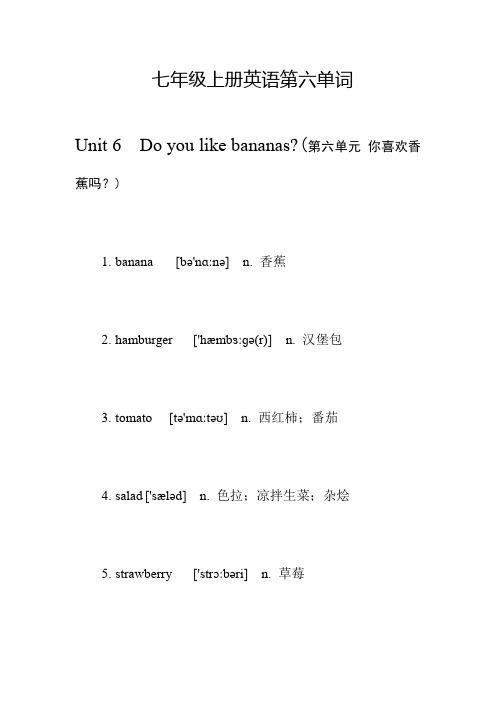
七年级上册英语第六单词Unit 6 Do you like bananas?(第六单元你喜欢香蕉吗?)1.banana[bə'nɑːnə] n. 香蕉2.hamburger['hæmbɜːɡə(r)] n. 汉堡包3.tomato[tə'mɑːtəʊ] n. 西红柿;番茄4.salad['sæləd] n. 色拉;凉拌生菜;杂烩5.strawberry['strɔːbəri] n. 草莓6.pear[peə(r)] n. 梨子;梨树k[mɪlk] n. 奶;牛奶;乳汁8.bread [bred] n. 面包9.birthday['bɜːθdeɪ] n. 生日10.dinner ['dɪnə(r)] n. 晚餐;晚宴;主餐11.week[wiːk] n. 星期;周12.food[fuːd] n. 食物;食品13.sure[ʃʊə(r)] adv. 当然;确实的;无疑地;不用客气14.burger['bɜːɡə(r)] n. 【C】汉堡包15.vegetable['vedʒtəbl] n. 蔬菜;植物;植物人16.fruit [fruːt] n. 果实;成果;水果17.right[raɪt] adj. 正确的;对的;右边的;合适的;18.apple['æpl] n. 苹果;珍宝;家伙19.then [ðen] adv. 那么;然后;当时;而且20.egg[eɡ] n. 蛋;卵;蛋形物21.carrot['kærət] n. 胡萝卜;〈非〉好处;报酬22.rice[raɪs] n. 米;米饭;稻23.chicken['tʃɪkɪn] n. 鸡;鸡肉;胆小者24.so[səʊ] 那么;这样;如此25.breakfast['brekfəst] n. 早餐26.lunch[lʌntʃ] n. 午餐27.star[stɑː(r)] n. 星;明星28.eat[iːt] v. 吃;吃饭;喝29.well [wel] adv. 很好的;相当地;令人满意的30.habit['hæbɪt] n. 习惯;习性31.healthy['helθi] adj. 健康的32.really['riːəli] adv. 实在;真正的;事实上33.question['kwestʃən] n. 问题;疑问34.want[wɒnt] v. 要;想要;通缉35.be[bi] v. 有;在;是;到达;拜访;变成36.fat[fæt] adj. 肥胖的;多脂肪的;丰满的37.ice-cream冰激凌38.think about思考;思索39.How about...?(提出建议)...怎么样?。
人教版新七年级上册Unit6知识点总结
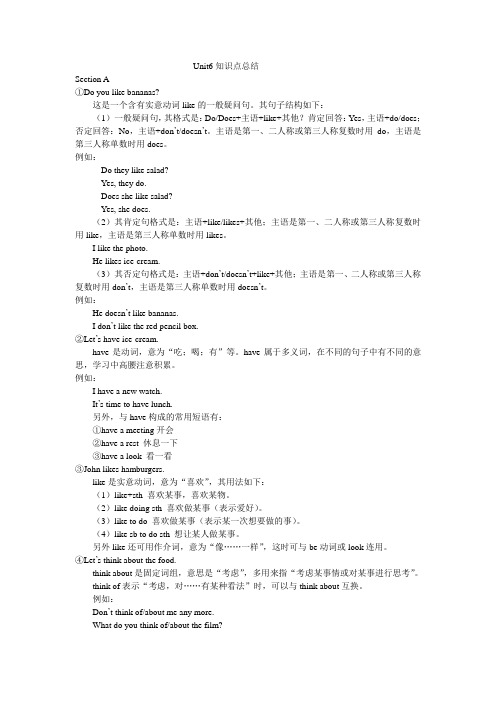
Unit6知识点总结Section A①Do you like bananas?这是一个含有实意动词like的一般疑问句。
其句子结构如下:(1)一般疑问句,其格式是:Do/Does+主语+like+其他?肯定回答:Yes,主语+do/does;否定回答:No,主语+don’t/doesn’t。
主语是第一、二人称或第三人称复数时用do,主语是第三人称单数时用does。
例如:---Do they like salad?---Yes, they do.---Does she like salad?---Yes, she does.(2)其肯定句格式是:主语+like/likes+其他;主语是第一、二人称或第三人称复数时用like,主语是第三人称单数时用likes。
I like the photo.He likes ice-cream.(3)其否定句格式是:主语+don’t/doesn’t+like+其他;主语是第一、二人称或第三人称复数时用don’t,主语是第三人称单数时用doesn’t。
例如:He doesn’t like bananas.I don’t like the red pencil box.②Let’s have ice-cream.have是动词,意为“吃;喝;有”等。
have属于多义词,在不同的句子中有不同的意思,学习中高腰注意积累。
例如:I have a new watch.It’s time to have lunch.另外,与have构成的常用短语有:①have a meeting开会②have a rest 休息一下③have a look 看一看③John likes hamburgers.like是实意动词,意为“喜欢”,其用法如下:(1)like+sth 喜欢某事,喜欢某物。
(2)like doing sth 喜欢做某事(表示爱好)。
(3)like to do 喜欢做某事(表示某一次想要做的事)。
2020七年级英语上册 Unit 6 Do you like bananas单元语法聚焦六 (新版)人教新目标版

Unit 6 Do you like bananas][行为动词的一般现在时结构和可数名词与不可数名词1.John likes hamburgers.约翰喜欢汉堡包。
2.I don't like salad.我不喜欢沙拉。
3.We like rice.我们喜欢米饭。
4.He likes icecream.他喜欢冰激凌。
5.He doesn't like vegetables.他不喜欢蔬菜。
6.—Do they like pears?他们喜欢梨吗?—No, they don't.不,他们不喜欢。
1.行为动词的一般现在时结构(以like为例)动词第三人称单数形式的规则变化:注意: have的第三人称单数形式是________,为不规则变化。
2.可数名词与不可数名词(1)名词分为可数名词与不可数名词。
可数名词指能用数字计数的名词。
不可数名词指不能直接用数字计数的名词,其数量可借助量词来表示,如a cup of coffee, a piece of bread。
可数名词复数的变化形式分为规则变化和不规则变化。
(2)名词复数的不规则变化需要同学们多积累。
如:man→men, woman→women, child→children, sheep→sheep, deer→deer, mouse→mice, tooth→teeth, foot→feet等。
(3)既可作可数名词又可作不可数名词的名词如:food (一般食物,不可数)→foods (食物种类,可数)fruit (一般水果,不可数)→fruits (水果种类,可数)chicken (鸡肉,不可数)→chickens (鸡,可数)orange (橙色;橙汁,不可数)→oranges (橙子,可数)(4)可数名词与不可数名词的用法①单数可数名词前常用冠词a, an或指示代词this, that来修饰。
②若表示一类事物时,可用a或an加上单数可数名词表示,也可用复数名词表示。
Unit6知识归纳人教版英语七年级上册(2)
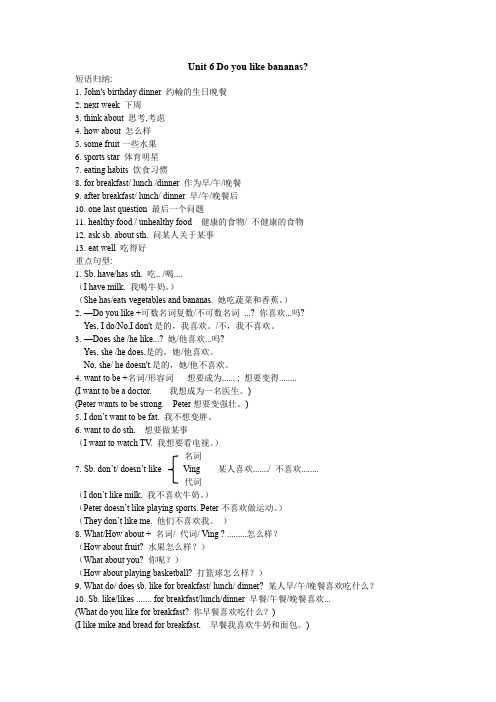
Unit 6 Do you like bananas?短语归纳:1.John's birthday dinner 约輸的生日晚餐2.next week 下周3.think about 思考,考虑4.how about 怎么样5.some fruit一些水果6.sport s star 体育明星7.eating habits 饮食习惯8.for breakfast/ lunch /dinner 作为早/午/晚餐9.after breakfast/ lunch/ dinner 早/午/晚餐后10.one last question 最后一个问题11.healthy food / unhealthy food 健康的食物/ 不健康的食物12.ask sb. about sth. 问某人关于某事13.eat well 吃得好重点句型:1.Sb. have/has sth. 吃.. /喝....(I have milk. 我喝牛奶。
)(She has/eats vegetables and bananas. 她吃蔬菜和香蕉。
)2.—Do you like +可数名词复数/不可数名词...? 你喜欢...吗?Yes, I do/No,I don't是的,我喜欢。
/不,我不喜欢。
3.—Does she /he like...? 她/他喜欢...吗?Yes, she /he does.是的,她/他喜欢。
No, she/ he doesn't.是的,她/他不喜欢。
4.want to be +名词/形容词想要成为...... ; 想要变得........(I want to be a doctor. 我想成为一名医生。
)(Peter wants to be strong. Peter想要变强壮。
)5.I don’t want to be fat. 我不想变胖。
6.want to do sth. 想要做某事(I want to watch TV. 我想要看电视。
河南省七年级英语上册Unit6Doyoulikebananas知识点总结(超全)
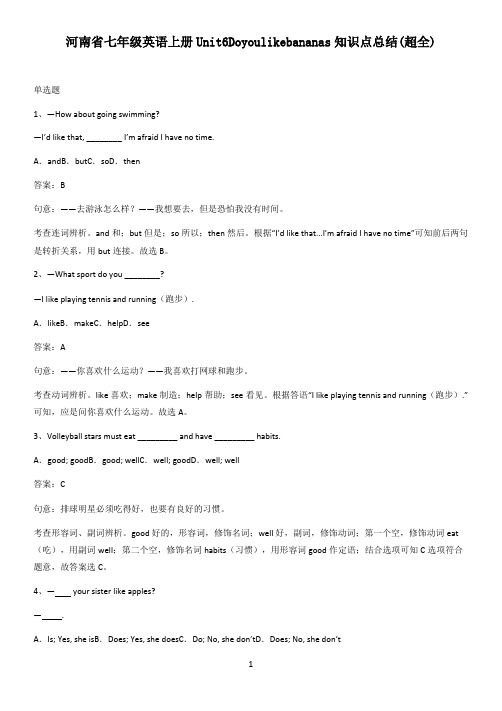
河南省七年级英语上册Unit6Doyoulikebananas知识点总结(超全)单选题1、—How about going swimming?—I’d like that, ________ I’m afraid I have no time.A.andB.butC.soD.then答案:B句意:——去游泳怎么样?——我想要去,但是恐怕我没有时间。
考查连词辨析。
and和;but但是;so所以;then然后。
根据“I’d like that...I’m afraid I have no time”可知前后两句是转折关系,用but连接。
故选B。
2、—What sport do you ________?—I like playing tennis and running(跑步).A.likeB.makeC.helpD.see答案:A句意:——你喜欢什么运动?——我喜欢打网球和跑步。
考查动词辨析。
like喜欢;make制造;help帮助;see看见。
根据答语“I like playing tennis and running(跑步).”可知,应是问你喜欢什么运动。
故选A。
3、Volleyball stars must eat _________ and have _________ habits.A.good; goodB.good; wellC.well; goodD.well; well答案:C句意:排球明星必须吃得好,也要有良好的习惯。
考查形容词、副词辨析。
good 好的,形容词,修饰名词;well 好,副词,修饰动词;第一个空,修饰动词eat (吃),用副词well;第二个空,修饰名词habits(习惯),用形容词good作定语;结合选项可知C选项符合题意,故答案选C。
4、— your sister like apples?— .A.Is; Yes, she isB.Does; Yes, she doesC.Do; No, she don’tD.Does; No, she don’t句意:—你的姐姐喜欢苹果吗?—是的,她喜欢。
- 1、下载文档前请自行甄别文档内容的完整性,平台不提供额外的编辑、内容补充、找答案等附加服务。
- 2、"仅部分预览"的文档,不可在线预览部分如存在完整性等问题,可反馈申请退款(可完整预览的文档不适用该条件!)。
- 3、如文档侵犯您的权益,请联系客服反馈,我们会尽快为您处理(人工客服工作时间:9:00-18:30)。
Unit 6 Do you like bananas
【单词总结】
banana/bə'na:nə/n.香蕉
hamburger/'hæmbə:gə/n.汉堡包
tomato/tə'ma:təu/n.西红柿
ice-cream/ais'kri:m/n.冰激凌
salad/'sæləd/n.沙拉
strawberry/'strɔ:bəri/n.草莓
pear/peə/n.梨milk/milk/n.牛奶
bread/bred/n.面包
birthday/'bə:θdai/n.生日
dinner/'dinə/n.(中午或晚上吃的)正餐
week/wi:k/n.周;星期
think about思考;思索
food/fu:d/n.食物
sure/ʃuə/adv.当然;肯定;一定
How about...?(提出建议)......怎么样?
burger/'bə:gə/n.(=hamburger)汉堡包
vegetable/'vedʒtəbl/n.蔬菜
fruit/fru:t/n.水果
right/rait/adj.正确的;适当的
apple/'æpl/n.苹果then/ðen/adv.那么
egg/eg/n.蛋;鸡蛋
c arrot/'kærət/n.胡萝卜
rice/rais/n.大米;米饭
chicken/'tʃikin/n.鸡肉
so/səu/conj.(引出评论或问题)那么
breakfast/'brekfəst/n.早餐;早饭
lunch/lʌntʃ/n.午餐
star/sta:/n.明星;星星
eat/i:t/v.吃
well/wel/adv.好;令人满意地
habit/'hæbit/n.习惯
healthy/'helθi/adj.健康的
really/'ri:əli/adv.真正地
question/'kwestʃən/n.问题
want/wɔnt/v.需要;想要
be/bi:/v.变成
fat/fæt/adj.肥的;肥胖的
【短语归纳】
1.John’s birthday dinner约翰的生日宴会
2.vegetable salad蔬菜沙拉
3.two tomatoes两个西红柿
4.eat well吃得营养
5.think about考虑
6.eat/have breakfast/lunch/dinner吃早/午/晚饭
7.sports stars体育明星
8.the volleyball star排球明星
9.ask sb.about sth.问某人某事
10.like hamburgers/ice-cream喜欢汉堡包/冰淇淋
11.like eating eggs喜欢吃鸡蛋
12.her eating habits她的饮食习惯
13.be(not)healthy(不)健康
14.one last question最后一个问题
15.healthy food健康食物
16.after breakfast/lunch/dinner早/午/晚饭后。
